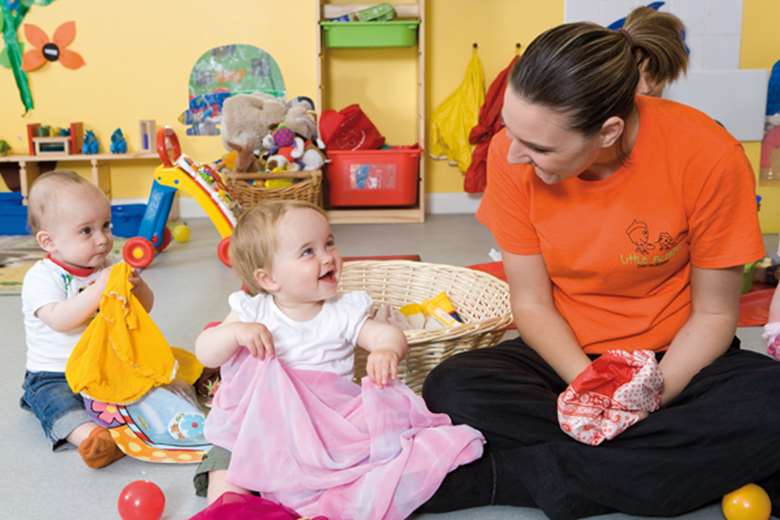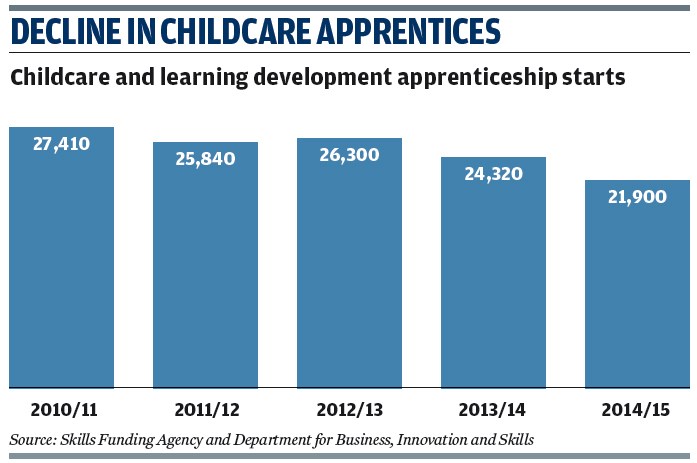Childcare recruitment crisis risks creating shortage of placements
Jess Brown
Tuesday, May 10, 2016
Recruitment of early years staff is falling fast as a result of the planned introduction of tougher qualification standards, prompting many experts to call for them to be scrapped or face a shortage in childcare places.

The independent review of the early years profession by Professor Cathy Nutbrown concluded in 2012 that childcare practitioners needed to improve their skills.
However, the policy implemented by government to address this has, according to experts, turned an already gradual reduction in the workforce into a full-scale recruitment crisis.
A report from the Professional Association for Childcare and Early Years earlier this year found the workforce had shrunk by five per cent over the past decade.
Figures from the government show the number starting early years apprenticeships has also dropped by one-fifth since 2010 (see graphic).
Meanwhile, a campaign group set up by early years organisations to oppose government early years workforce plans, says the number of apprentices on Early Years Educator (EYE) Level 3 courses has dropped 70 per cent.
The cause, say campaigners, is the introduction from September of requirements for apprentices on the EYE Level 3 to have GCSE English and maths at grade C in order to count in a nursery’s ratios, which sets the maximum number of children a staff member is allowed to care for (see key questions, below).
The qualification change was first announced as an entry-level standard, but was revised to become a requirement upon completion of the course following a government U-turn last summer. It means that apprentices will need to study GCSEs alongside their apprenticeship to gain their qualifications in order to count in the ratios when they enter the workforce.
But early years leaders are warning that the raising of the bar is further reducing the number of EYE Level 3 entrants, which in turn could hit the number of childcare places providers can offer – something that will be compounded by the doubling of the free childcare entitlement from September 2017.
Functional skills
Before the EYE was introduced in September 2014, functional skills were accepted as an alternative qualification on entering the workforce as a qualified early years worker, allowing students to brush up their maths and English skills while on the job.
Many organisations in the sector have spoken out in favour of reintroducing functional skills, which sees learners develop their writing, numeracy and IT skills by putting them into everyday practice.
Mark Dawe, chief executive of the Association of Employment and Learning Providers, is in favour of functional skills, and also sees the importance of workers having good academic skills.
“It is very important they have good English and maths, but when the requirements were announced as an entry level, we said it would be disastrous in terms of employment, and of course apprenticeships figures plummeted,” he says.
Dawe says it has already had an impact on the number of entrants to the sector, a trend that is set to worsen.
“We are already seeing it in terms of recruitment, and it will be worse when the 30 hours [free childcare] comes in,” he says.
“The government wants to improve children’s access to quality childcare. This means there needs to be more workers in the sector.
“The government needs to allow English and maths to develop in an appropriate way.”
Dawe says functional skills allow people to adapt what they learn around the needs of the job rather than according to an academic syllabus. Without this approach, he fears some learners will have to wait many years before they reach the required GCSE standard.
“If schools have been unable to get someone through their GCSEs after having taught them for years, for someone to do it in a timeframe of 18 months is crazy,” Dawe says.
“Our belief is that it is about taking a different approach with English and maths, and not hitting them over the head with GCSEs over and over again.
“Once someone is doing a course they feel is relevant to them, in this case childcare, then they will enjoy it and want to do English and maths as well. They understand the relevance of them, and that is where functional skills come in.
“We need to run apprenticeships and make sure there are enough in the workforce. Hearing from our providers who work on the ground, they know what’s required to get them through English and maths, and they said from the beginning that [exit level requirements] would be a disaster.”
Gill Mason, principal at North Liverpool Community College, says the majority of learners she sees start their apprenticeship without GCSEs. She says this has led to an “absolute crisis” in recruitment.
“We have a massive recruitment crisis happening in the sector because of the implications of that,” she says. “We’ve got a lot of nurseries closing down because they can’t recruit a sufficient number of qualified staff.
“If they are leaving school after 11 years without GCSEs, to get EYE Level 3 – which is a big qualification – and GCSE maths and English in the 12-18 months timeframe is nigh-on impossible for training providers to deliver because apprentices are not at college full time.
“This is hitting nurseries from every angle. You have a situation now where you’ve got a government wanting to increase free childcare to 30 hours, but when there is not enough staff to look after the children to enable a quality service.”
Fay Gibbin, training manager at Busy Bees Early Years Training Academy, says the qualifications change has introduced too much focus on academic attainment over personality when recruiting to the profession (see box).
She says: “It could mean potentially hundreds of talented individuals aspiring to enter the industry will not have the qualification to do so.”
In addition, she says as those who have not passed the GCSEs will not be able to count towards nursery ratios they will be “far less desirable” to potential employers.
She backs calls by campaigners for the government to reinstate functional skills as an alternative to GCSEs in an attempt to avoid deterring more people from entering the childcare workforce.
Conversely, some students that enrolled on the EYE Level 3 before the government U-turn on GCSEs being an exit, rather than entry requirement, are choosing not to take up jobs in the sector because their grades can open up more lucrative careers.
Kathryn Sutherland, assessor for Crackerjack Training in Birmingham, says: “What we are finding is that by the end of their apprenticeship, these learners do not want to stay in childcare and they are off to university.”
According to figures from the National Careers Service, experienced nursery staff with EYE Level 3 can earn between £15,000 and £22,000 a year.
“This is the first year I have written university application references,” says Sutherland.
“I have students going on to do, among other things, teacher training, creative writing, law and paramedic training. It seems we are trying to upskill a workforce who then realise they have many other options that pay much better.”
EYE Level 3 qualification – 5 key questions
What can you do with it?
It enables learners to care for children from nought to five-years-old, and work as early years educators. Learners can work in day nurseries and reception classes in primary schools, and act as assistants to early years teachers
What does it cover?
Topics taught include health and wellbeing; play, development and school readiness; professional development; and childcare legislation. Learners work or volunteer in early years settings alongside their studies, and are also assessed on this
Who delivers the training?
Training organisations across England offer the EYE apprenticeship. These usually take between one and two years to complete. From September, learners must achievee maths and English GCSEs at grade C or above
to qualify upon completion
Why is it important to nurseries?
When a childcare professional has an EYE Level 3, settings can operate at maximum staff-to-child ratios. These are one member of staff for: three children aged under two; four children aged two and three; and eight children aged over three
What are the pay scales?
According to the National Careers Service, experienced nursery
workers with an EYE Level 3 qualification can earn between £15,000 and £22,000, depending on responsibilities
Source: Statutory framework for the early years foundation stage, 2014
‘Personality rather than qualifications is what counts when recruiting staff’
By Fay Gibbin, training manager, Busy Bees Early Years Training Academy, outlines why personality and enthusiasm are more important than academic qualification
When recruiting our entry-level apprentices onto our childcare apprenticeships, it is crucial that, above all, we recruit on personality and an aptitude for the job ahead.
As a result, we can be sure that each apprentice we employ will approach their role with enthusiasm, a keen interest and a determination to deliver excellent care to the children in our nurseries.
Ultimately, we do not believe that setting a prerequisite of academic qualifications will prove a practitioner’s ability to nurture or inspire a child, specifically a child under the age of five.
What is absolutely vital is to recognise that certain skills necessary to successfully nurture a young mind and, in turn, shape a child’s future, are inherent within a person and cannot be taught – skills such as empathy, thoughtfulness and enthusiasm.
Above all, these are the skills that we look for within our staff and will result in the delivery of the very best childcare and early years education.
It is, of course, important that those who dedicate their lives to working with children achieve good results in English and maths.
We should continue to provide opportunities to individuals who did not reach the required levels in school for whatever reason, but have the ambition and the potential to become a successful practitioner.




